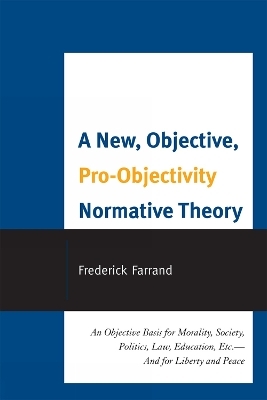
A New, Objective, Pro-Objectivity Normative Theory
University Press of America (Verlag)
978-0-7618-5286-5 (ISBN)
A New, Objective, Pro-Objectivity Normative Theory tries to solve fundamental normative moral, social, political, educational, legal, etc. problems. It defends a uniquely evidence-based, objective theory. The theory argues it has one objective, primary end, and plural a-objective, secondary ends irrelevant to that end. The theory's basis permits great liberty as well as cultural, sexual, artistic, lifestyle, and much other diversity regarding secondary ends. The primary end is a general principle implying non-sexism, non-racism, types of happiness, freedom, education, sympathy, peace, democracy, altruism, flourishing, fairness, and much more. Emotions and various other subjective experiences are considered important. Part II discusses such specific practical applications at length. Part I mainly explains and defends the theory's foundation and general guidelines. One guideline prescribes applying the theory's rationally-critical approach to the theory, stressing that fallibilism and skepticism may be appropriate regarding some suggested specifics —- but that future research can increasingly avoid problems here.
Frederick Farrand is a retired Australian philosopher and psychologist who previously researched and/or taught psychology, moral, social, and political philosophy, and some epistemology. He retired mainly to have time and energy to write books such as this. He and his partner, Mary, live with their dog, Buster, their children having grown up and left home.
Chapter 1 INTRODUCTION Chapter 2 ENDNOTES TO THE INTRODUCTION Part 3 PART I: MOSTLY THEORY Chapter 4 PART I, SECTION 1: ARGUING FOR AN OBJECTIVE THEORY; PRO-OBJECTIVITY Chapter 5 ENDNOTES TO PART I, SECTION 1 Chapter 6 PART I, SECTION 2: MORE PRELIMINARY DISCUSSION OF PRACTICAL APPLICATIONS Chapter 7 ENDNOTES TO PART I, SECTION 2 Chapter 8 PART I, SECTION 3: STRUCTURAL FORM; A-OBJECTIVITY; MORE ON PRO-OBJECTIVITY Chapter 9 CONCLUDING REMARKS REGARDING PART I Chapter 10 ENDNOTES TO PART I, SECTION 3 Part 11 PART II: MOSTLY PRACTICAL APPLICATIONS Chapter 12 PART II, SECTION 1: FURTHER ISSUES AND APPLICATIONS Chapter 13 ENDNOTES TO PART II, SECTION 1 Chapter 14 PART II, SECTION 2: OTHER FURTHER ISSUES AND APPLICATIONS Chapter 15 CONCLUDING REMARKS Chapter 16 ENDNOTES TO PART II, SECTION 2 Chapter 17 Appendixes Chapter 18 References And Bibliography Chapter 19 INDEX
| Erscheint lt. Verlag | 29.12.2010 |
|---|---|
| Verlagsort | Lanham, MD |
| Sprache | englisch |
| Maße | 155 x 231 mm |
| Gewicht | 338 g |
| Themenwelt | Geisteswissenschaften ► Philosophie ► Ethik |
| Recht / Steuern ► EU / Internationales Recht | |
| ISBN-10 | 0-7618-5286-7 / 0761852867 |
| ISBN-13 | 978-0-7618-5286-5 / 9780761852865 |
| Zustand | Neuware |
| Haben Sie eine Frage zum Produkt? |
aus dem Bereich


